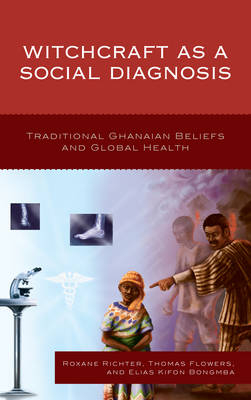
Witchcraft as a Social Diagnosis
Traditional Ghanaian Beliefs and Global Health
Seiten
2017
Lexington Books (Verlag)
978-1-4985-2318-9 (ISBN)
Lexington Books (Verlag)
978-1-4985-2318-9 (ISBN)
This book examines medical outreach in the condemned witches’ village of Gnani in Ghana, focusing on clashes between traditional beliefs, religious tenets, and contemporary medical science. It analyzes questions of stigmatization to explore how disease, injury, and illness relate to social condition and the dialogue surrounding witchcraft.
This interdisciplinary manuscript examines one nonprofit’s five years of medical outreach in the condemned witches village of Gnani in Ghana, focusing on the clashes between traditional Ghanaian beliefs, African religious tenets, and contemporary Western medical science. The research draws upon 1,714 patient interventions and 95 personal interviews, exposing the inherent challenges of separating indigenous beliefs surrounding fate and witchcraft convictions from contemporary interpretations of biological pathogens, structural and gender-based violence, and evidence-based medicine.
This book offers a novel perspective on witchcraft as it examines questions of stigmatization in order to extrapolate how disease, injury, and illness relate to social condition and the dialogue surrounding witchcraft. These unprecedented insights will serve to uncover and explore rural Ghanaian challenges in gender-based violence, religion, legal and political tenets, human rights, and medical science and their many implications for those in search of health parity, social justice, gender equity, and human rights.
This interdisciplinary manuscript examines one nonprofit’s five years of medical outreach in the condemned witches village of Gnani in Ghana, focusing on the clashes between traditional Ghanaian beliefs, African religious tenets, and contemporary Western medical science. The research draws upon 1,714 patient interventions and 95 personal interviews, exposing the inherent challenges of separating indigenous beliefs surrounding fate and witchcraft convictions from contemporary interpretations of biological pathogens, structural and gender-based violence, and evidence-based medicine.
This book offers a novel perspective on witchcraft as it examines questions of stigmatization in order to extrapolate how disease, injury, and illness relate to social condition and the dialogue surrounding witchcraft. These unprecedented insights will serve to uncover and explore rural Ghanaian challenges in gender-based violence, religion, legal and political tenets, human rights, and medical science and their many implications for those in search of health parity, social justice, gender equity, and human rights.
Roxane Richter is president of World Missions Possible. Thomas Flowers is medical director of World Missions Possible. Elias Kifon Bongmba is the Harry and Hazel Chair in Christian Theology and professor of religion at Rice University.
1. History, Tradition, and Religion
2. Gnani – Banished to the Witches’ Village
3. Medical Concepts of Disease and Illness
4. Gnani – Etiology of Diseases and Disorders
5. Pathologies of Prejudice in Social Mechanisms
6. Facing Forward
| Erscheinungsdatum | 25.02.2017 |
|---|---|
| Verlagsort | Lanham, MD |
| Sprache | englisch |
| Maße | 158 x 237 mm |
| Gewicht | 454 g |
| Themenwelt | Geisteswissenschaften ► Religion / Theologie ► Weitere Religionen |
| Studium ► Querschnittsbereiche ► Geschichte / Ethik der Medizin | |
| Sozialwissenschaften ► Politik / Verwaltung | |
| ISBN-10 | 1-4985-2318-8 / 1498523188 |
| ISBN-13 | 978-1-4985-2318-9 / 9781498523189 |
| Zustand | Neuware |
| Haben Sie eine Frage zum Produkt? |
Mehr entdecken
aus dem Bereich
aus dem Bereich
Die Geschichte eines Weltzentrums der Medizin von 1710 bis zur …
Buch | Softcover (2021)
Lehmanns Media (Verlag)
17,95 €
Krankheitslehren, Irrwege, Behandlungsformen
Buch | Softcover (2024)
C.H.Beck (Verlag)
39,95 €


